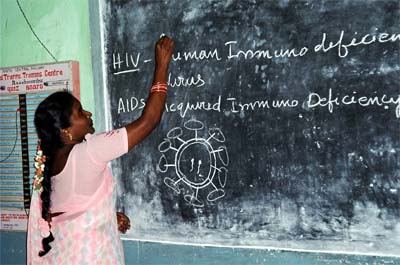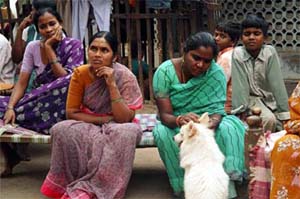Feb 05, 2026
Feb 05, 2026
by Anita Anand
 Every morning, in the state of Andhra Pradesh (AP), a group of men and women are making change and making history. They are setting out to do something that most people do not normally do - talking about sex, sexuality and HIV/AIDS.
Every morning, in the state of Andhra Pradesh (AP), a group of men and women are making change and making history. They are setting out to do something that most people do not normally do - talking about sex, sexuality and HIV/AIDS.
V Samson and S K Sultana Begum are among some 48 peer counsellors who head towards schools, railway colonies, health units, railways hospitals, training centers, junior colleges, running rooms and mahila samitis (women's groups) - all known as 'entry points' and affiliated with the Indian Railways.
The project - Equalizing Gender Relationships in the Context of HIV/AIDS Epidemic - is being implemented by the NGO, Railway Women's Empowerment and AIDS Prevention Society (REAPS). It is based in Vijayawada, about 294 km from Hyderabad, the capital of AP. At the heart of the project is its peer counsellors.
Samson is a peer counsellor at the railways schools. In the school grounds it's break time, and the boys and girls seeing him, run towards him. "Three days a week, I work with students of Classes 8 and 9, both boys and girls. In the beginning, I gave information on HIV. They called me the AIDSbhai! Then I started giving health information, general information about the body and linked it to HIV, and finally gender. It's been a struggle," says Samson, 24.
To introduce issues around HIV/AIDS, a module was developed by Lady Irwin College, New Delhi, and incorporated into the curriculum. The module contains information, games, stories and techniques around the issues of HIV/AIDS.
It's 10 am and S K Sultana Begum has begun to make her rounds of the Railway colony in Eluru, a 90-minute journey from Vijayawada. She steps in and out of various homes, encouraging the women to come out for a mahila samiti meeting. The women are still completing their morning chores. The children have gone to school and the men to work. It takes a while for the women to come out but eventually about 50 women gather. Some small children and pets also join in.
Sultana, 40, is a trained Auxiliary Nurse Midwife (ANM). Her husband works as a cabin master in the Railways.
 Mahila samitis are places where women come together to catch up with their news. The peer counsellors are welcomed as persons with knowledge not only about HIV/AIDS, but also health issues, good recipes, hints for child rearing and income generation schemes.
Mahila samitis are places where women come together to catch up with their news. The peer counsellors are welcomed as persons with knowledge not only about HIV/AIDS, but also health issues, good recipes, hints for child rearing and income generation schemes.
The REAPS project is a partnership between the Ministry of Railways (Railway Board) and UNIFEM.
The Indian Railways is the second largest employer in the world (the Chinese army is the first largest employer), and the largest public sector undertaking in India. It has approximately 16 lakh (1.6 million) employees; almost 70,000 railway stations which service 14.5 million people everyday.
In 1994, the United Nations Development Program (UNDP) sponsored a study on HIV/AIDS in the Indian Railways, as it had a very large mobile population that was highly vulnerable. The Railways were equally concerned.
UNIFEM is the UN agency devoted to empowerment of women. In 1999, its South Asian Regional Program based in New Delhi was looking to mainstream organizations for outreach and advocacy on gender and HIV/AIDS. For UNIFEM, the tying up with Indian Railways meant wide outreach and dynamic partnership. The Railways identified the South Central headquarters of Vijayawada as a site for a pilot project, because of high prevalence rates.
"The strength of the Railways (in the project) are its hospitals, staff that is open to the project, and the railway colonies which are well suited for its implementation," says Dr D K Das, Director-General, Railway Health Services.
The Vijayawada Division of the South Central Zone spans 1,327 km, has 30,000 employees (a total population of 1.5 million), 15 health units, and a divisional headquarter hospital. The REAPS offices are located in the hospital and cover eight districts of Vijayawada Division.
The challenge of addressing HIV/AIDS in India and AP is daunting.
India has a population of a little over one billion. It is estimated that 5.1 million individuals are infected with HIV. The epidemic in India is dynamic and a number of distinct epidemics coexist, sometimes within the same state, with different vulnerabilities, stage of maturity, and impact. The highly stratified nature of Indian society, cultural myths around sex, large-scale migration, gender discrimination and huge populations of marginalized people make it extremely vulnerable to the HIV/AIDS epidemic.
AP, with a population of 76 million people, has the second highest number of HIV infections among Indian states - with about 470,000 reported cases. It is also active in awareness and prevention of HIV/AIDS.
The goal of the project is to prevent the spread of HIV/AIDS by strengthening the capacity of Indian Railways in gender-sensitive counselling services. And, to enhance the understanding of the fundamental link between gender and HIV/AIDS - as a strategy to prevent the spread of HIV/AIDs in India.
"For UNIFEM, gender means working with men, and mainstreaming issues into their agenda. Mainstreaming is wonderful but hard work. It requires a lot of thought and follow-through," says Chandni Joshi, Regional Director, UNIFEM.
The project began in 2002. What has been its experience so far?
"The most challenging aspect of the project was the opening up of the channels of communication throughout the community through peer counsellors and various entry points. Interacting with absolute strangers and getting them to confide, was a part of this challenge," says Dr Girija Shankar, Director, Industrial Health, Railway Board, located at the Rail Bhawan, New Delhi.
The idea of using peer counsellors arose from community-based studies, where most people surveyed were comfortable having people from their community talking to them about HIV/AIDS. The peer counsellors are men and women, between the ages of 22-65, and have been raised in and outside the Railway community. They work together in twos and threes. They have received training in counselling and gender perspectives from the Christian Medical Centre in Vellore and the Asmita Women's Resource Centre in Hyderabad.
The other 'entry points' of the project are the Railway health units where peer counsellors offer information on HIV/AIDS, meet the patients, and work closely with doctors and nurses. The Voluntary Testing and Counselling Centre (VCTC) at the Railway hospital in Vijayawada routinely refers its clients to the peer counsellors, and vice versa.
Other entry points are the trade unions (with a membership of 16 lakh), and the 'running rooms' where engine drivers rest between their shifts and the counsellors meet them. As a result of the work of REAPS, workers say they are more comfortable asking questions about sex, homosexuality, condoms and HIV/AIDS. Engine drivers have asked for condom boxes in running rooms. Many drivers also ask for information on HIV/AIDS to read on their trips.
The target population of the project is employees whose minimum level of education is a high school certificate. Some are illiterate; and others have studied till secondary school. Typically, the jobs require physical strength and skill, and the men are prone to alcohol, aggression and violence, sexual recklessness - casual sex with multiple partners or paid sex - and a lack of responsibility. At the same time, they are also heads of households, and support wives and children.
Despite a high level of awareness of HIV/AIDS and key modes of transmission, there is a gap between knowledge levels and behavior in relation to prevention measures.
The communication challenge has been to work towards breaking strong sexual stereotypes and through this, providing women a space in which they can negotiate - starting with men. The communication strategy (through posters, slogans, written material) has focused on addressing and involving men as a route to empowering women.
Besides the work at the entry points, a major concern was with people living with HIV/AIDS (PLWA) and their families.
A credit needs assessment confirmed that target groups were already in deep debt, with a few families having debts of more than Rs 1 lakh. A Revolving Fund was created, based at the South Central Railways Women's Welfare Organization (RWWO) in Vijayawada. Those eligible were women living with HIV/AIDS, and those women affected by HIV/AIDS in the railway community.
A great deal of the project work is around communications at the individual, family and community level. The peer counsellors focus on gender-sensitive messages on prevention, care and treatment.
"We need to focus on the condom, not as a symbol of promiscuity or for prevention of STIs, but as a 'sexual health promoting gadget' between man and man, women and man, for a happy life. In the family planning program, the primary function of the condom was for child spacing. Now we want to promote the dual function of the condom - lead a happy sexual life - without infection and with child spacing. Plan a family till you settle down, but don't hamper your sexual life," says Dr Prasad, of Andhra Pradesh State Control Aids Society (APSACS).
The REAPS project has a chance of real success. The zeal of the Indian Railways, the strategic interventions guided by UNIFEM, a small and dedicated team of project staff, and committed and energetic peer counsellors are a start.
15-May-2005
More by : Anita Anand

|
Railway Women's Empowerment and AIDS Prevention Society (REAPS). I want hydrabad adress&phone numbers mariyamma adress my cell no 9666678474 |